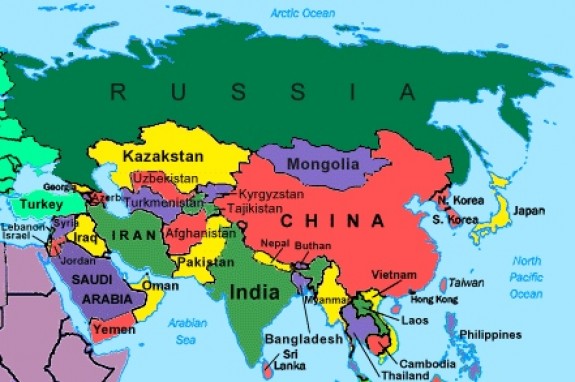
Russia Kowtows to Beijing in Advance of APEC
Rigged court case lays groundwork for suppressing Falun Gong
By Andrey Volkov
Epoch Times Staff, August 21, 2012
Last week, a 2008 court decision inspired by policies made in Beijing became real for one older Russian woman who practices Falun Gong. Olga Chernova saw her home ransacked and the Falun Gong literature and materials she owned confiscated on the pretext that the materials contained “extremist” content.
Over 60 years old, Chernova lives 40 miles outside Vladivostok, which sits on the Pacific Ocean less than 40 miles from the China border. The city will host the Asia-Pacific Economic Cooperation summit in early September, an event that will be attended by high-level Chinese officials. Russian Falun Gong practitioners say that as the summit approaches they have begun experiencing harassment and detentions.
Chernova’s friend Yulia, who lives in Vladivostok, said that Chernova was surprised, as such a thing had never happened to her before. Yulia, who contacted The Epoch Times to tell this story, also said that many locals know Chernova and could see her doing Falun Gong exercises on a local beach in the morning.
Yulia has said that over 10 policemen including a local police inspector ransacked Chernova’s home without telling her the purpose of their visit. Some came directly from Vladivostok.
“She recognized some officers because she happened to give some Falun Gong newspapers to them, and she could see their kind and positive reaction,” Yulia said.
“She lives in a small town and all the people know her. There is no one there who she did not offer materials telling about the practice of Falun Gong and its persecution [in China ],” Yulia added.
Olga practices Falun Gong (also known as Falun Dafa), a spiritual practice that contains five sets of gentle, meditative exercises and teachings based on the principles of truthfulness, compassion, and tolerance.
In July 1999 the former leader of the Chinese Communist Party (CCP) Jiang Zemin launched a nationwide campaign to eradicate the practice. Jiang feared the Chinese people would find its traditional moral teachings more attractive than communist ideology and was alarmed at the number of people who had taken up the practice.
At the time Chinese officials estimated that there were 70 million to 100 million people practicing Falun Gong—more than were members of the CCP.
The Ban

The impetus for the invasion of Chernova’s home was laid in 2008 by a court at the opposite end of Russia from Vladivostok, in the city of Krasnodar in Russia’s southwest corner.
In August 2008 the Krasnodar prosecutor asked the court to declare “Zhuan Falun,” the fundamental text of Falun Gong, to be “extremist material,” and the court did so. Russia passed a law in 2002 that bans extremist material and the prosecutor was seeking to apply this law to the Falun Gong text.
Practitioners successfully appealed on the grounds that they were never notified of the hearing. But the court then again affirmed its original decision and, in December 2011, denied a second appeal.
Mikhail Sinitsyn, a lawyer for the Falun Gong practitioners at the December hearing, said that court officials did not allow the practitioners’ case to be heard. “All motions by the prosecutor to appoint experts were accepted, but the same motions from our side were rejected,” he said.
As a result, expert opinions determining that “Zhuan Falun” had no extremist content were not even considered by the court.
An appeal to the Russian Supreme Court was denied in early July. Falun Gong practitioners have now taken their case to European Court of Human Rights.
Maxim Gafiayk, a Ukrainian human rights lawyer, told The Epoch Times that Russian officials did not seem to invite the opinions of serious and independent religious scholars and liberal arts experts when the extremist literature list was created in 2007.
”The existence of this list itself indicates a serious act of barbarism, roughness and aggression. It is the lobby of some narrow circles in Russia and it is obvious that it will not benefit the country,” he said, adding the law leaves a lot of room for abuses.
For the last several years Russian officials have often banned practitioners from holding public activities educating people about the persecution of Falun Gong in China, refused to register local Falun Gong associations, and stopped Falun Gong practitioners from Europe, Moldavia, and Ukraine from coming to Russia.
In addition, there have been cases of the forced repatriation of practitioners of Chinese nationality from Russia to China, including a 44-year-old woman with her 8-year-old daughter, both of whom were accredited U.N. refugees.
The Supreme Court decision upholding the ban on “Zhuan Falun” has already made things worse, according to Sergei Skulkin, a member of the Russian Falun Dafa Association.
“Publishers can’t continue to print copies [of Zhuan Falun]. Shops can’t sell the book,” said Skulkin. “Those having this book risk being arrested. In actuality, local Falun Gong practitioners who are mostly Russian are reporting frequent harassment and intensified monitoring by the authorities.”
In Vladivostok in late July four Falun Gong practitioners were detained as they came to a print shop to take brochures related to the practice and its persecution in China.
Made in Beijing
Russian practitioners recently sent a letter to media outlets highlighting the pressure authorities are putting on them. They say that Russian officials are following Beijing’s policy of persecuting Falun Gong.
At around the same time that the 2002 law banning extremist activity was passed, the People’s Republic of China began pushing for Russia to be granted access to the World Trade Organization.
These actions followed on a 2001 treaty of Neighborhood, Friendship, and Cooperation between Beijing and Moscow. According to this agreement, each side does not permit the creation or operation of any organization or group on its territory that is a threat to the sovereignty and security of the other country.
This treaty has been cited by Russian officials as they have taken actions against Falun Gong.
Ludmila Alekseeva, the chairman of the Moscow Helsinki Human Rights Group, said that Russian officials are used to “easily and thoughtlessly violating human rights.”
“It looks like due political considerations and in order to gain Beijing’s support such decisions have been made and they do not do any credit to those who have made them,” she said.
Skulkin says that even though Russian policy has turned against Falun Gong, many officials have started supporting the practitioners.
But there are limits to what the officials can do. “They are part of the governmental mechanism and have to follow instructions from above,” Skulkin said.
The Russian practitioners have begun to gain support from outside Russia. On Jan. 20, the European Parliament passed a resolution expressing “deep concern” about the misuse of anti-extremism legislation in Russia, including the “improper banning” of the spiritual literature of Falun Dafa.
Around the same time, Vice President of the European Commission Catherine Ashton said in a letter addressed to European parliamentarians that she is “very concerned about the case of Falun Gong practitioners in Russia, as well as about the broader implications it entails.”
Skulkin said that over 100,000 copies of Zhuan Falun have been sold in the country, and that the case is becoming a big deal for Russia.
